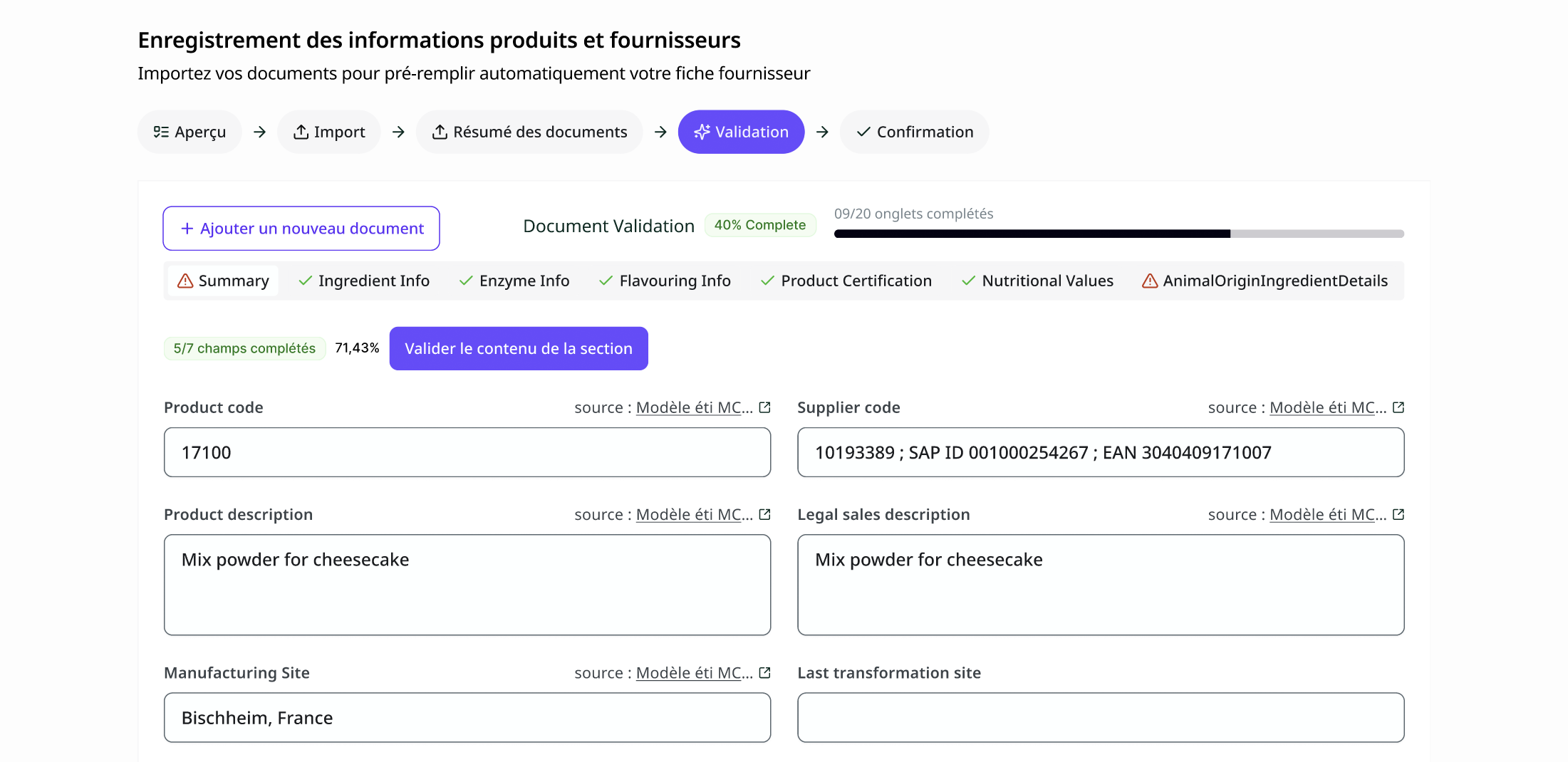How to Set Up and Optimize Your Supplier Assessment
As part of a GFSI (Global Food Safety Initiative) certification, supplier management and evaluation play a crucial role. This approach ensures that your raw materials and products meet the food safety and quality requirements necessary to remain in compliance with standards such as IFS, BRCGS or FSSC 22000. Here is a comprehensive guide to help you set up an effective supplier assessment and discover how tools like Tracklab (www.tracklab.co) can transform this process.

How to Set Up and Optimize Your Supplier Assessment
As part of a GFSI (Global Food Safety Initiative) certification, supplier management and evaluation play a crucial role. This approach ensures that your raw materials and products meet the food safety and quality requirements necessary to remain in compliance with standards such as IFS, BRCGS or FSSC 22000. Here is a complete guide to help you set up an effective supplier assessment and discover how tools like Tracklab (www.tracklab.co) can transform this process.
Why evaluate your suppliers?
1. Ensuring compliance with GFSI requirements
GFSI standards require traceability and total control of raw materials. Rigorous evaluation of suppliers ensures that they meet these food safety and quality requirements.
2. Reducing risks
Non-compliant suppliers can compromise your supply chain and result in product recalls, fines, or reputational damage. A proactive assessment identifies and minimizes these risks.
3. Improving collaboration
By defining clear criteria and communicating expectations, you strengthen your relationships with your suppliers and promote continuous improvement.
Key steps to set up a supplier assessment
1. Define evaluation criteria
Identify the aspects to be evaluated based on GFSI requirements and your specific needs:
- Food safety : Certificates (e.g. IFS, BRCGS, FSSC 22000).
- Quality : Compliance with product specifications and quality processes.
- CSR : Environmental impact and working conditions.
- Logistics : Respect of deadlines and stock management.
2. Collect supplier data
Gather key information such as certifications, previous audits, data sheets, and performance histories.
3. Evaluate and rate suppliers
Assign a score to each supplier based on the criteria defined. You can use a weighted rubric to give more importance to certain critical aspects.
4. Set up a follow-up
Implement a tracking system to:
- Update data and documents regularly.
- Identify performance gaps or emerging risks.
- Plan follow-up audits or corrective actions.
5. Communicate results
Share your evaluations with your suppliers to allow them to understand your expectations and improve.
Tips for optimizing supplier evaluation
1. Standardize your processes
Create templates for rubrics, document requests, and reports. This ensures consistency and reduces errors.
2. Digitize document management
Use tools to automate the collection, tracking, and renewal of supplier documents. This frees up time for tasks with higher added value.
3. Integrate artificial intelligence
Modern solutions can quickly analyze large amounts of data to identify non-conformities or assess risks.
4. Prioritize your efforts
Focus your efforts on suppliers that are critical to your business or those with a history of non-compliance.
5. Implement a continuous improvement plan
Put in place actions to support your suppliers in complying, in particular through training or regular audits.
Why Tracklab is your best ally for supplier evaluation
Tracklab (www.tracklab.co) is a platform that simplifies and optimizes supplier assessment management, thanks to its tools specially designed to meet the needs of GFSI certified companies.
1. A centralized and comprehensive database
Tracklab brings together all the quality, regulatory, technical and CSR information of your suppliers in one place. This gives you a global and clear vision to assess their compliance.
2. Automating document renewals
The platform makes it possible to automatically collect and renew supplier documents. This reduces the time spent on these tasks by 80% and ensures that all information is always up to date.
3. Embedded artificial intelligence
Tracklab offers AI tools for:
- Pre-validate documents according to the requirements of your GFSI standards.
- Extracting data keys to certificates or technical data sheets, thus speeding up the evaluation process.
4. Custom alerts
Automatic reminders help you keep track of critical deadlines, like audits or certificate updates.
5. Improving supplier relationships
Thanks to its intuitive interface, Tracklab facilitates collaboration with your suppliers, allowing them to easily submit or update their documents.
Conclusion
Evaluating suppliers is an essential step in ensuring compliance and performance as part of a GFSI certification. By adopting a structured approach and relying on efficient tools such as Tracklab, quality managers can not only optimize this process, but also strengthen collaboration with partners, reduce risks and increase efficiency.
With Tracklab, evaluating your suppliers becomes simple, fast, and compliant with GFSI requirements, allowing you to focus on the continuous improvement of your supply chain.
Simplify your management
Free your teams from reminders and spreadsheets. Track your compliance in real time, at scale.






